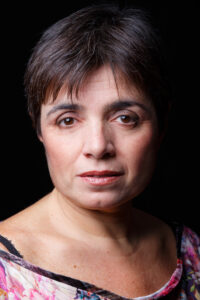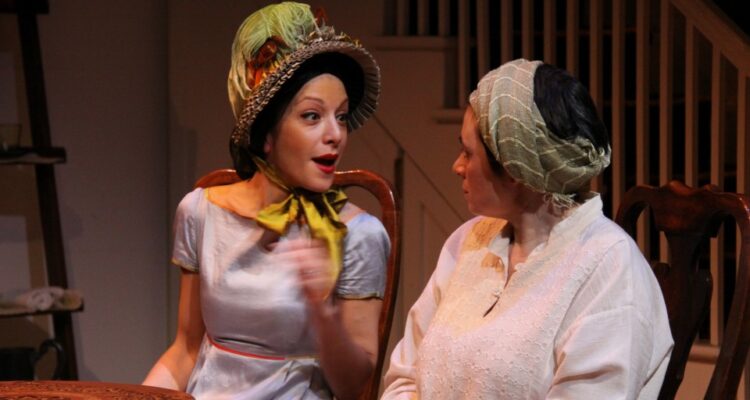 Laura Caparotti is the Founding Artistic Director of Kairos Italy Theater, the Italian Theater Company in New York. She also founded the In Scena! Italian Theater Festival, which is about to kick off its eleventh year in New York City. Laura sat down with Austin Fimmano to talk about the festival’s origins and operations in the United States.
Laura Caparotti is the Founding Artistic Director of Kairos Italy Theater, the Italian Theater Company in New York. She also founded the In Scena! Italian Theater Festival, which is about to kick off its eleventh year in New York City. Laura sat down with Austin Fimmano to talk about the festival’s origins and operations in the United States.
Austin Fimmano: How did Kairos Italy Theater come to be?
Laura Caparrotti: I brought myself to New York for the first time in 1993. When I decided to move, it was 1996. I was already an actress, kind of a director, a producer a little bit in Italy…you know, you’re young, you do everything. But I was working professionally only as an actor and assistant director. Then I came here one summer and I loved New York. I wanted to leave Italy for a while, and I decided to apply for an internship at The Kitchen. They said yes, so I went there.
Slowly I saw that there was something missing, and that was Italian theater. The Italians were doing American theater, and not interested in [Italian theater]. And so I started doing Italian theater, and then it became the [Kairos] Italian Theater company in New York, which is incredible to me. Now we are in our twenty-fourth year.
AF: What would you say is the biggest difference between Italian theater and American theater?
LC: We work differently. The way we approach a character is more of, let’s say the British way. You read the script, and what’s in the script is the important thing. There’s no method-acting. That doesn’t mean that here is bad and there is good or vice versa. It’s just a different way to approach the work. There are great actors in every place and great theater everywhere.
I’ve been here for thirty years, but what I realized lately is that America really is a place where theater is the playwright first. The playwright is very important. But in Italy, the playwright is not so important. The director is the more important role. I see other directors here, and often they don’t tend to have the same recognition as the playwright.
AF: What inspired the In Scena! festival?
LC: In 2013, there was a program by the Italian government: the Year of Italian Culture in the United States. That year, an attache at the Italian embassy in Washington who is also a friend said to me, “Laura, I need more theater for this Year of Italian Culture, we don’t have enough. What can you do?” I said, “I’ll do a festival!”
Now, why? Because living in New York, you have many ethnicities, you have many countries, you have many kinds of theater. At that time, there were many festivals. Nowadays the theater scene has changed a little bit. But at the time there were many festivals, but not an Italian theater festival. Coming from Italian theater, knowing Italian theater, still going to Italian theater in Italy, I knew how beautiful it was. I was like, “Why can we not see Italian theater in New York?” Also, I wanted to do it in all five boroughs. I said to myself, “There are beautiful places all over the city. Why do we have to focus only on Manhattan? Manhattan is overrated.”
And so I started with free admission. For me, in theater, everyone should be paid first. Second, it should be free if possible. A lot of people cannot afford it, and I really think theater is a medicine for the soul. So this is what I did.
And I decided for translation, we would use supertitles. I had used supertitles in another production previously, so I knew a little bit.
And so we started. At the beginning it was only three shows and two readings. Now in its eleventh year, we decided to stay with eight shows. We had some years with fifteen shows, but it were too much. Eight shows is a good number.
Last year we had some people who were reluctant, but they came and they were like, “wow!” We’re still trying to bring people in. And we go to some theaters that are really far away, in boroughs where it’s difficult to attract audiences. But it’s good to go. This year we may go to a place that is very unknown, a beautiful place in Greenpoint. We’ll try.
AF: I see that you’re also adding shows in Toronto this year?
LC: Yes. Last year we went to Detroit, Los Angeles, and San Diego. And this year, Toronto. You know, once they [the casts and crews] are here, traveling to another location only takes two or three days. Last year was a lot because we traveled so much. And last year we also did a special fall edition for the tenth anniversary. We went to San Diego, Santa Rosa [California], Calgary [Alberta], and Lethbridge [Alberta]. Fourteen days of touring. It was beautiful. We were able to do it thanks to support from the Italian government, and it was fantastic. These are communities that don’t usually get events from Italy, and it was amazing.
And the five boroughs, again, I think are important. Now everyone is doing it – Tribeca [Film Festival] is doing it, the Fringe [Festival] is doing it, and in fact sometimes I speak with other directors who call me for advice, asking, “What is it that you do, what do you think is best, what do you think is the challenge?” But I’m a big fan, and I don’t care if I have to bring people myself.
And I think also for the artists coming from Italy, visiting other boroughs [outside of Manhattan] is a great experience for them.
AF: I wanted to go back and talk about the supertitles the festival uses. It’s so important if you’re bringing Italian theater to a primarily English-speaking audience. What is the process for setting them up and having them work with the actors’ performances?
LC: At the beginning it was just something that we tried. Donatella Codonesu is the associate director, she’s based in Italy, and she’s the expert now. At first we tried to do supertitles together. We just said, “let’s see what happens.” Then we met Mauro Conti, who is the head of one of the most important agencies for supertitles for opera. He was so kind to give us a class, just the two of us, to explain how to do supertitles.
But we realized that it’s one thing to do supertitles for the opera or big theaters. Everything is there, you have time to rehearse. But when you do it for a small theater, it’s more challenging. Where do you put the supertitles, how do you keep them from mixing with the lights? So it’s really an expertise that was built on doing it enough times.
Right now we collaborate with a school in Milan called the Civica Scuola [Interpreti e Traduttori Altiero] Spinelli – it’s a school for translators and interpreters. They translate the supertitles. It’s not a translation for publication, it’s only for our purposes. So the students do the translations for the supertitles, and we tutor them in the process. It’s really about following the rhythms. You have to understand what the rhythm of the play is. There are a given number of characters you can have, of letters you can have, because the eye cannot read more than two lines – I think it’s 34, 35 characters – at a time. The challenge is doing it for live theater, because actors, they don’t always follow the script. And on top of that, the technical aspects are always a little different [from theater to theater], so you have to adjust. But it’s a process, and you come to understand a lot.
It’s also very personal. Sometimes Donatella does the first night of a show, and I have to fill in for the second night. There’s discussion about which words are used, or the timing. As an actor I see timing a little bit differently than she does. But in the end there’s no wrong way to do it, because it’s live theater, live performances. I find it very fascinating.
Donatella is now part of a European project that is going to teach how to do supertitles for three very big productions in different countries in Europe. It’s an interesting topic because there are classes on subtitles for film, but supertitles for theater? Very rare.
AF: The In Scena! festival works very closely with the Casa Italiana Zerilli-Marimò. What does this partnership bring to the festival?
LC: Kairos Italy Theater is in residence at Casa Italiana. We get free space, we get the first showing of everything we do, we do events together. And I’m really the theater part of Casa Italiana. So when Casa Italiana said, “Of course, we’ll be one of the locations for the festival,” it was perfect. They have a small stage, but they have all the lights. And they have an audience who knows me, who knows my work, and is very happy to come. They bring financial support for us. Without them, it would be impossible to do the festival.
This year, the Italian government is not supporting us. They didn’t even reply to my email. Previous directors and attaches were fantastic, but after ten years of deep collaboration, the people who are there now no longer want to participate. If it was not for Casa Italiana, there wouldn’t be a festival.
I’ve been with Casa Italiana since 2012. I started a project there in 1997. They never imposed their views and they never told me, ”No, you cannot do that.” If there is something they are not convinced about, they’ll just say, “Laura, are you sure?” It’s a great way to grow and to understand why you’re doing what you’re doing. It’s a great partnership in that way. What makes sense, and what doesn’t make sense? It’s a perfect relationship because over the years, they’ve pushed me to look at the things that weren’t making sense.
AF: What do you think is the most important thing about bringing Italian theater to New York?
LC: Besides knowing more about our country, I want to show people that there are subjects, themes, and issues that are the same here and there. I think it’s very important to understand that there are issues that involve everyone, not just Americans. That is the most important thing for me.

